1. Introduction: Bridging Chinese Wisdom and Modern Career Paths
Have you ever wondered why some jobs just feel right while others never seem to click, no matter how hard you try? In today’s fast-paced American workplace, more people are searching for meaningful careers that truly fit who they are. Enter Bazi, an ancient Chinese system of astrology that’s catching the attention of professionals across the U.S. looking for a purpose-driven career path.
What is Bazi?
Bazi, also known as the Four Pillars of Destiny, uses your birth date and time to create a personal “blueprint” based on the five elements (Wood, Fire, Earth, Metal, Water). Think of it as a unique cosmic fingerprint that reveals your strengths, natural talents, and areas for growth. While Bazi has roots in centuries-old Chinese wisdom, its practical applications are surprisingly relevant for modern career planning in America.
Why Are Americans Turning to Bazi?
With so many career choices—and the pressure to find not just any job, but the right one—it’s no wonder people are exploring new ways to understand themselves. Here’s why Bazi is becoming popular among U.S. professionals:
| Reason | How Bazi Helps |
|---|---|
| Desire for Purpose | Bazi identifies what motivates you and aligns with your core values. |
| Career Confusion | Bazi highlights natural talents and suggests fitting industries or roles. |
| Work-Life Balance | Bazi offers insight into how you interact with others and manage stress. |
| Diversity & Inclusion | Bazi embraces individuality, supporting diverse career paths in a multicultural society. |
The Bazi Blueprint: More Than a Horoscope
Unlike daily horoscopes or personality quizzes, Bazi digs deep into your personal energies. It doesn’t put you in a box; instead, it helps unlock your potential so you can thrive at work and beyond. As more Americans seek authentic career satisfaction, blending Eastern wisdom like Bazi with Western ambition could be the key to a fulfilling professional journey.
2. Understanding the Bazi System
If you’re new to the world of Chinese astrology, the Bazi system—also known as the “Four Pillars of Destiny”—might sound mysterious. But at its core, Bazi is all about uncovering your unique strengths, personality traits, and potential life path by looking at your birth data. Let’s break down the basics so you can see how it can help guide your career decisions.
What Is Bazi?
Bazi literally means “Eight Characters” in Mandarin. These eight characters are created from your birth date and time: year, month, day, and hour—each with a Heavenly Stem and an Earthly Branch (which together form each “pillar”). This ancient practice dates back over a thousand years in China but has recently gained popularity among Americans looking for fresh perspectives on self-understanding and career planning.
The Four Pillars Explained
Each pillar represents a different aspect of your life:
| Pillar | Represents |
|---|---|
| Year Pillar | Family background, heritage, early influences |
| Month Pillar | Career environment, work style, talents |
| Day Pillar | Your core personality, personal relationships |
| Hour Pillar | Aspirations, future potential, children or legacy |
Bazi’s Origins and Cultural Significance
Bazi was developed during China’s Tang Dynasty as a tool for predicting destiny and finding harmony between people and their environment. While it has deep roots in Chinese tradition, modern interpretations have made it accessible worldwide—including right here in the U.S., where it’s used not just for matchmaking but also for personal growth and career guidance.
How Bazi Reveals Your Strengths and Career Path
The main idea behind Bazi is that everyone is born with certain innate energies—like elements (Wood, Fire, Earth, Metal, Water)—that shape our personalities and abilities. By analyzing the balance or imbalance of these elements in your chart, a Bazi reading can highlight:
- Your natural strengths (e.g., creativity, leadership)
- Areas where you might need support (e.g., communication skills)
- The kinds of work environments where you’ll thrive (team-based vs. independent roles)
- Certain industries or roles that align with your elemental makeup (like artistic jobs for strong Wood element types or finance for Metal types)
Quick Elemental Personality Reference Table
| Element | Key Traits | Ideal Careers |
|---|---|---|
| Wood | Growth-oriented, creative, adaptable | Design, teaching, wellness industries |
| Fire | Passionate, dynamic, persuasive | Sales, entertainment, leadership roles |
| Earth | Reliable, nurturing, stable | Healthcare, real estate, hospitality |
| Metal | Organized, analytical, disciplined | Finance, law, engineering |
| Water | Flexible, intuitive, communicative | Writing, research, counseling |
This personalized approach makes Bazi a helpful compass—not only for self-discovery but also for charting a fulfilling career path that fits who you truly are.

3. Mapping Your Career Personality with Bazi
If you’re curious about how Chinese astrology can help you navigate your career in the American workplace, understanding your Bazi profile is a great place to start. Bazi, also known as the Four Pillars of Destiny, decodes your birth date into a unique energetic blueprint. By learning to interpret your Bazi chart, you can discover how your natural strengths and tendencies align with real-world skills, workplace behaviors, and professional growth opportunities.
What Does Your Bazi Profile Reveal?
Your Bazi chart is made up of four pillars: Year, Month, Day, and Hour. Each pillar represents different aspects of your personality and life path. Here’s a quick breakdown:
| Pillar | Represents | Career Connection |
|---|---|---|
| Year | Social circle & environment | How you network and collaborate with others |
| Month | Work habits & skills | Your talents, work ethic, and adaptability on the job |
| Day | Core personality & mindset | Your leadership style and motivation at work |
| Hour | Aspirations & creativity | Your long-term goals and innovative thinking |
Linking Bazi Elements to Real-World Skills
The five elements in Bazi—Wood, Fire, Earth, Metal, and Water—each relate to key workplace skills valued in American companies. Here’s how they might play out in your career:
| Bazi Element | Key Strengths | Workplace Example |
|---|---|---|
| Wood | Growth-oriented, creative thinker, adaptable | Great for roles in marketing, education, or tech startups where innovation counts. |
| Fire | Passionate, energetic, inspiring leader | Succeeds in sales, public relations, or team management positions. |
| Earth | Dependable, practical, supportive team player | Fits well in project management or HR roles requiring stability and empathy. |
| Metal | Organized, detail-oriented, analytical mind | Excels in finance, law, engineering—jobs that need precision and structure. |
| Water | Resourceful, persuasive communicator, flexible thinker | Suits careers in counseling, consulting, or any role that involves negotiation and relationships. |
Your Bazi at Work: Practical Tips
- Reflect on Your Strengths: Look at which element is strongest in your chart. What kind of tasks make you feel energized?
- Notice Your Challenges: If an element is weak or missing, think about where you struggle at work—and what support or training could help you grow.
- Create Your Own Blueprint: Match your Bazi profile with job descriptions to see where you’ll thrive best—whether it’s leading a team meeting or brainstorming new ideas behind the scenes.
Bazi Insights for Professional Growth
- Reflect on Your Strengths: Look at which element is strongest in your chart. What kind of tasks make you feel energized?
- Notice Your Challenges: If an element is weak or missing, think about where you struggle at work—and what support or training could help you grow.
- Create Your Own Blueprint: Match your Bazi profile with job descriptions to see where you’ll thrive best—whether it’s leading a team meeting or brainstorming new ideas behind the scenes.
Bazi Insights for Professional Growth
The more you understand about your Bazi profile, the easier it becomes to build confidence and set career goals that fit your true nature. In the next part of The Bazi Blueprint series, we’ll explore how to use these insights to map out real-life steps toward your dream job.
4. Bazi in Action: Translating Insights into Career Planning
Understanding your Bazi chart is just the beginning—putting its wisdom to work can help you find a job, company culture, and career path that truly fit who you are. Here’s how you can use your Bazi insights to make smarter decisions about your professional journey in the American workplace.
Step 1: Decode Your Core Talents and Values
Start by looking at the key elements in your Bazi chart, especially your Day Master (your self-element) and supporting elements. These reveal natural strengths and values. For example, someone with strong Wood energy might excel in growth-oriented roles, while someone with Metal may thrive where structure and logic are valued.
| Bazi Element | Natural Strengths | Ideal Job Fields |
|---|---|---|
| Wood | Growth, creativity, leadership | Education, entrepreneurship, creative industries |
| Fire | Passion, communication, inspiration | Sales, public relations, entertainment |
| Earth | Stability, reliability, supportiveness | Healthcare, HR, finance |
| Metal | Organization, precision, analysis | Law, engineering, tech development |
| Water | Adaptability, strategy, networking | Consulting, research, travel industry |
Step 2: Match Your Chart With Workplace Cultures
Bazi isn’t just about what job you do—it’s also about where you’ll feel comfortable. For example:
- Lively Fire types: Thrive in fast-paced startups or companies that value open communication.
- Grounded Earth types: Feel most at home in established organizations with clear hierarchies.
- Flexible Water types: Prefer dynamic environments that encourage innovation and change.
How to Spot Company Culture Fit:
- Research company values: Check websites and employee reviews for clues on culture.
- Ask during interviews: “How does your team handle change?” or “What’s the management style here?”
- Reflect on past experiences: When did you feel most energized or drained at work?
Step 3: Plan Your Next Move Using Bazi Timing Cycles
Your Bazi chart also shows when certain energies are strongest in your life—these are known as “luck cycles.” In Western terms, think of them as trends that favor particular actions or opportunities over time.
| Bazi Timing Cycle | Career Moves to Consider |
|---|---|
| Supportive Cycle (favorable elements) | Pursue promotions, take on new challenges, launch projects. |
| Challenging Cycle (clashing elements) | Focus on skill-building, networking, or consolidating gains rather than risky moves. |
| Nurturing Cycle (elemental balance) | Cultivate relationships and long-term plans; seek mentorships. |
Your Personalized Bazi Blueprint for Career Success
The real magic happens when you combine all this information—your talents (from Step 1), ideal environments (from Step 2), and timing (from Step 3). Take some time to journal or map out your findings. You might even create a simple chart like this for yourself:
| Your Bazi Element(s) | Your Top Strengths | Your Ideal Workplaces | This Year’s Focus (Bazi Cycle) |
|---|---|---|---|
| Wood + Water | Creativity & Strategy | Evolving companies/startups Marketing agencies Tech firms with diverse teams |
Pursue leadership training Pitch new ideas Expand professional network |
Tapping Into Your Unique Path Forward
No two people have the same Bazi chart—and no two careers should look identical either. By understanding yourself through this ancient Chinese lens and applying it to modern American workplaces, you can confidently choose jobs and environments that bring out your best. Don’t be afraid to experiment and adjust as you grow; your Bazi is a blueprint meant to guide—not limit—your career adventure!
5. Overcoming Challenges: Cultural Integration and Self-Empowerment
Addressing Common Misconceptions About Chinese Astrology
When people in the United States hear “Chinese astrology,” they often picture fortune cookies or New Years celebrations. In reality, Bazi (Four Pillars of Destiny) is a time-tested system for understanding personal strengths and potential career paths. Some common misconceptions include:
| Misconception | Reality |
|---|---|
| Its only about predicting the future. | Bazi focuses on self-awareness and practical guidance, not just predictions. |
| You must follow every recommendation literally. | Bazi offers insights that you can adapt to your own goals and circumstances. |
| Bazi clashes with Western science or career planning. | Bazi complements other self-discovery tools and modern career strategies. |
Integrating Bazi Wisdom with American Career Development Strategies
Bringing Bazi into your career journey doesn’t mean abandoning what you know. Instead, it’s about blending ancient insight with practical action. Here’s how you can make Bazi work for you in an American context:
Step 1: Embrace Self-Knowledge
Bazi helps you recognize your natural talents and challenges. Pair these insights with popular American career assessment tools like the Myers-Briggs Type Indicator or StrengthsFinder to get a fuller picture of your ideal work environment.
Step 2: Set Realistic Goals
Use Bazi guidance to clarify your values and ambitions, then apply American goal-setting frameworks such as SMART goals (Specific, Measurable, Achievable, Relevant, Time-bound) to create actionable steps.
Step 3: Communicate Your Unique Value
In American workplaces, being able to articulate what makes you special is key. Let your Bazi profile guide you in highlighting unique strengths during interviews or networking events.
Step 4: Build Resilience Through Self-Empowerment
Bazi encourages self-acceptance—embrace both your strengths and weaknesses. In the U.S., resilience is highly valued; use setbacks as opportunities to learn and grow, supported by both Eastern wisdom and Western self-help strategies.
Quick Tips for Combining Bazi with American Career Advice:
- Share your Bazi insights with mentors or coaches—they may offer new perspectives on your strengths.
- Join diverse professional networks that appreciate multicultural approaches to success.
- Stay open-minded: blend advice from both traditions for the most balanced path forward.
By integrating the wisdom of Bazi with American values like initiative and adaptability, you empower yourself to navigate any career challenge with confidence and clarity.


